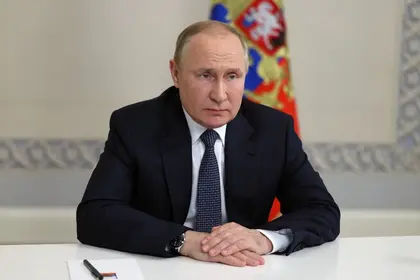Russian President Vladimir Putin has again resorted to “nuclear blackmail”, boasting that his “unrivaled” ICBM RS-28 “Sarmat” (aka Satan-2) will be ready to be deployed by the end of 2022.
Addressing graduates from Russia’s military academies on Wednesday, 22 June, President Putin said: “The Sarmat heavy intercontinental ballistic missile was successfully tested. It is planned that by the end of this year, the first such complex will be put on combat duty.”
- Check the most up-to-date Ukraine news reports from today.
- Access the latest Ukraine news coverage for today.
JOIN US ON TELEGRAM
Follow our coverage of the war on the @Kyivpost_official.
In April, Russia announced the first test launch of its new nuclear missile. Shortly after, Dmitry Rogozin, chief of the Russian state space agency Roskosmos, said that 50 missiles would soon be added to Russia’s nuclear arsenal.
The Satan-2 can carry more than 10 nuclear warheads, and with an effective range of 6,200-11,800 miles, the Kremlin would be able to strike any spot on the planet – including the UK in under three minutes. “I advise the aggressors to be more polite with us,” Rogozin warned in a statement on 22 May.
Since starting the war four months ago, Moscow has repeatedly threatened the world with a nuclear war. In May, after Finnish President Sauli Niinistö announced his country’s intention to join NATO, the Kremlin threatened to target Finland, the UK, and the USA with Satan-2 missiles.
Former Russian President Dmitry Medvedev has also rattled the nuclear saber at western governments helping Ukraine, previously pledging to do everything he can “to exterminate them all”.
According to Ukrainian and international intelligence sources, there are currently no visible signs of Russia preparing to use nuclear arms. Normally, intercontinental ballistic missiles and nuclear warheads are stored separately, and the latter’s movement can easily be spotted.
In a public statement on April 21, British Prime Minister Boris Johnson stated that if Putin dares to use weapons of mass destruction against Ukraine, the UK would immediately respond.
Dmitry Kiselev, the notorious Kremlin propagandist, responded by warning the British government that Russia could “easily erase the United Kingdom from the map” with a single nuclear torpedo from a submarine. British defense experts are nevertheless assertive that their intelligence keeps a watchful eye on all movements of Russian nuclear warheads, and should any pre-launch evidence emerge a preemptive nuclear strike would be imminent, or a Russian missile could be shot down and reduced to a “dirty bomb”.
Prof. Malcolm Chalmers, Deputy Director-General of Royal United Services Institute (RUSI), maintains that the risk of a nuclear conflict is not high. “Where the risk rises is if there is some sort of catastrophic collapse of Russian conventional capability, which could happen if they begin to lose quite a lot of territory,” Chalmers told CBC News in an interview at RUSI’s London offices on June 19.
You can also highlight the text and press Ctrl + Enter



